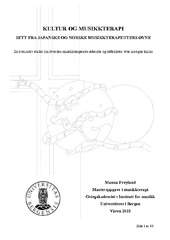| dc.contributor.author | Frøyland, Manna | eng |
| dc.date.accessioned | 2015-08-14T06:59:12Z | |
| dc.date.available | 2015-08-14T06:59:12Z | |
| dc.date.issued | 2015-05-13 | |
| dc.date.submitted | 2015-05-13 | eng |
| dc.identifier.uri | https://hdl.handle.net/1956/10271 | |
| dc.description.abstract | På grunn av at forfatteren av denne masteroppgaven er halvt japansk og halvt norsk, har hun valgt å intervjue to norske musikkterapeuter som jobber i Norge, og to japanske musikkterapeuter som jobber i Japan, for å sammenlikne deres måter å arbeide på. Metoden som ble brukt for å samle inn data var kvalitativt e-post intervju. For det første viser funnene at kultur spiller en rolle i musikkterapeuters arbeid. I denne oppgaven vil begrepet «kultur» bli forstått på fem ulike nivå, som nasjonalitet, regionalkultur, institusjonskontekst, familiekultur og individ. Disse kulturelle nivåene overlapper stadig, og former musikkterapeuters måte å forholde seg til klientene på. For det andre, viser funnene at å være bevisst på sin egen kulturelle bakgrunn og situert kunnskap vil være en ressurs for musikkterapeuter. Dette fordi når man er bevisst på sin egen kultur, blir det enklere å ta hensyn til klientenes kultur. Selv om det fantes noen ulikheter mellom informantenes svar, var det også flere likhetstrekk. Både nordmenn og japanere viste seg å være like oppmerksomme, omsorgsfulle, ressursorienterte og ville det beste for klientene. Forfatteren har tro på at musikkterapi er noe som kan få både klienter og terapeuter til å blomstre, på tvers av ulike kulturelle lag. | en_US |
| dc.description.abstract | «Culture and music therapy - through Japanese and Norwegian music therapists' eyes.» A qualitative research about how music therapists work and reflect about their own culture in music therapy work. Since the author of this thesis is both Japanese and Norwegian, she chose to interview two Japanese music therapists who work in Japan, and two Norwegian music therapists working in Norway, to see if there were differences between their ways of working as a music therapist. The method used was a qualitative interview in the form of an Email. Through the process of analysis, two themes became clear. First of all, the culture really does play a role in music therapists' works. The term culture would be understood in five different levels in this thesis like nations, regions, institutions, family culture and individuals. All of these levels are interacting with each other, and forming music therapists' ways of being with their clients. This has confirmed that not only our nationality determine how we are acting and thinking. Secondly, the findings indicate that to be aware of own cultural background and situated knowledge is a resourceful tool music therapists can use to build a good relationship with clients. It is because when we are attentive to our own cultures, it would be easier for us to also take clients' cultures into account. Even though some differences between participants' answers were seen, there is a commonality that both Japanese and Norwegian music therapists are attentive, caring and want to do the best for the clients. Perhaps these are common characteristics for people who want to become a music therapist, across the nationalities and cultures. | en_US |
| dc.format.extent | 4460237 bytes | eng |
| dc.format.mimetype | application/pdf | eng |
| dc.language.iso | nob | eng |
| dc.publisher | The University of Bergen | eng |
| dc.rights | Copyright the Author. All rights reserved | eng |
| dc.subject | kultur | eng |
| dc.subject | musikkterapi | eng |
| dc.subject | Norge | eng |
| dc.subject | Japan | eng |
| dc.subject | situert kunnskap | eng |
| dc.subject | e-postintervju | eng |
| dc.subject | regionalkultur | eng |
| dc.subject | nasjonaliteter | eng |
| dc.title | Kultur og musikkterapi. Sett fra japanske og norske musikkterapeuters øyne. En kvalitativ studie om hvordan musikkterapeuter arbeider og reflekterer over sin egen kultur | eng |
| dc.type | Master thesis | |
| dc.description.version | publishedVersion | |
| dc.description.degree | Master i Musikkterapi | |
| dc.description.localcode | MAHF-INMUT | |
| dc.description.localcode | MUTP350 | |
| dc.subject.nus | 715136 | eng |
| fs.subjectcode | MUTP350 | |
